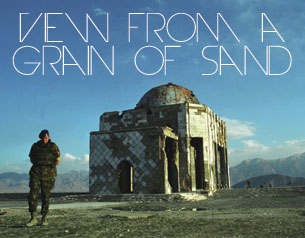View from a Grain of Sand
Told through the eyes of three women, this films covers recent Afghan history from the point of view of those who suffered most.
 This is the story of how Afghan women have had their rights stripped from them over the last thirty years. Told through the eyes of three women, this films covers recent Afghan history from the point of view of those who suffered most. Too often silenced, these women share their memories, hopes and fears with us. Their personal stories are combined with rarely seen archival footage to create a powerful and evocative portrait of a divided nation.
This is the story of how Afghan women have had their rights stripped from them over the last thirty years. Told through the eyes of three women, this films covers recent Afghan history from the point of view of those who suffered most. Too often silenced, these women share their memories, hopes and fears with us. Their personal stories are combined with rarely seen archival footage to create a powerful and evocative portrait of a divided nation.
'When we first came here, the place was like a desert. We registered as refugees and the UN gave us some plastic sheets. We spent all winter on those plastic sheets', Shapiray and her family fled during the civil war which tore the country apart after the end of Soviet occupation. They spent many years in what was supposed to be a temporary shelter. 'There was no medicine or clinics, nothing. We were living like barbarians in prehistoric times'. They returned to their former home last year but years of conflict had left it in ruins.
Roeena works as a doctor in Pakistan. She has chosen not to go back to Afghanistan. 'I would love to see my country again but I also want a normal life', she says. Her memories of Kabul in the late sixties conjure up an idyllic lifestyle, a stark contrast to the harsh reality women later had to face.'That was a time when boys and girls were going to college together. It was not an issue. Women's education was encouraged, I felt I could do everything.'
Whilst King Zahir Shah's progressive reforms were confined to the cities, tribal leaders in rural Afghanistan refused to accept them. Wajia's story is an example of the life imposed on most women in the countryside. 'My brothers were sent to school but I had to stay home and help my mother'. In villages, women were and still are considered to be men's property.
When the Soviets invaded Afghanistan in 1989, millions fled and Wajia's husband decided to join the resistance fighters. Disaster struck: 'He was ambushed by the Russians. I wasn't given the details, I was just told he'd been killed'. Thanks to America secretly funding extremist anti-government rebels, what started as a nationalist struggle grew into a pan-Islamic cause. Jihad was re-cast as the military duty of all Muslims to fight against Communist infidels.
This was catastrophic to women. In the mid 90s, the Taliban successfully drove out the warlords but they imposed the most repressive laws Afghanistan had ever seen. 'Women weren't allowed to go out, they were beaten on the streets, or worse.' Wajia remembers, 'Islam does not say that women should be in burqa.' The infamous footage of women executed in Kabul's football stadium was seen around the world.
The Taliban were routed in 2001 but the new government never managed to gain real authority. 'The fundamentalists who caused the civil war are back in power' says Roeena 'I don't have plans to go back as long as this government is in power.' Although women are now officially allowed an education, Wajia tells us that the lack of security has grown so bad that many won't leave their homes. 'They are back terrorising us. We live in fear'. Sadly women are still paying the highest price.
Director: Meena Nanji
FULL SYNOPSIS
